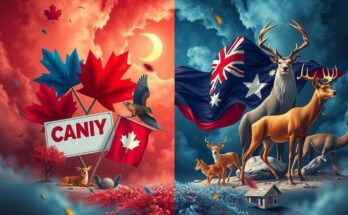Zanzibar’s VP Othman Masoud Sharif, along with other leaders like Edwin Sifuna, Bobi Wine, and Tundu Lissu, were denied entry into Angola and their passports confiscated at Luanda Airport. They were part of a delegation invited for a meeting by UNITA, Angola’s opposition party. The act faced severe condemnation from participants and led to calls for urgent explanations from Angolan authorities.
Several notable African leaders, including Zanzibar’s First Vice President Othman Masoud Sharif, Nairobi Senator Edwin Sifuna, and opposition politicians Bobi Wine and Tundu Lissu, have been denied entry into Angola. The leaders are currently detained at Luanda Airport, where their passports have reportedly been confiscated. They had traveled to Angola as part of a delegation of over 40 political representatives for a planned meeting, which was officially sanctioned by UNITA, the country’s leading opposition party.
The African delegation was invited for a two-day meeting by the Office of the President of UNITA. Key figures anticipated to attend the forum included former Presidents Ian Khama of Botswana and Andrés Pastrana Arango of Colombia, in addition to South Africa’s Agriculture Minister, Comrade John Steenhuisen, and Mozambican opposition leader, Comrade Venancio Mondlane. Despite the invitation, the Angolan authorities placed a travel restriction against them, sending them back to their home countries without providing a clear rationale.
Sifuna took to social media to communicate their predicament, stating, “UNITA President Adalberto Costa invited us to Angola, but the government has denied us entry!”. He also shared an official request from Costa asking for the necessary visas for the group to enter Angola, emphasizing that UNITA would take responsibility for the visitors during their stay.
Tundu Lissu expressed strong disapproval of the Angolan authorities’ actions, highlighting the notable status of the detained leaders, who represent a variety of nations across Africa. He argued that such actions undermine diplomatic relations, especially between Tanzania and Angola, historically viewed as allied nations. Lissu called for condemnation of what he termed “shabby treatment” by the Angolan immigration authorities.
The ACT-Wazalendo party has voiced its outrage, demanding explanations from the Angolan government regarding the disallowed entry and the confiscation of leaders’ passports. Mwanaisha Mndeme, the party’s Secretary of Foreign Affairs, referred to the actions as degrading and a breach of diplomatic protocol. They have urged Tanzania’s Ministry of Foreign Affairs to summon the Angolan Ambassador for clarification and sought the immediate return of the confiscated passports.
The denial of entry into Angola for prominent leaders, including Zanzibar’s First Vice President and notable opposition figures highlights significant diplomatic tensions. The rejection, unexplained by Angolan authorities, raises questions about treatment of political representatives within the region, especially among nations with historical ties. Calls for accountability from ACT-Wazalendo and condemnation of the actions underscore the importance of respectful diplomatic engagement among African nations. It remains to be seen how the Angolan government will respond to the demands for clarification and the return of the leaders’ passports.
Original Source: eastleighvoice.co.ke




